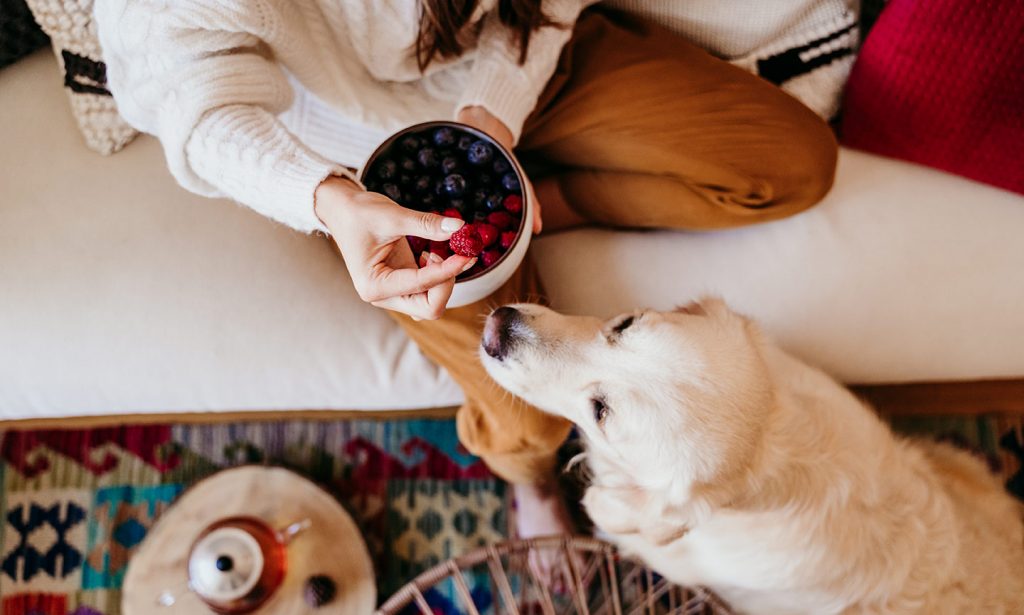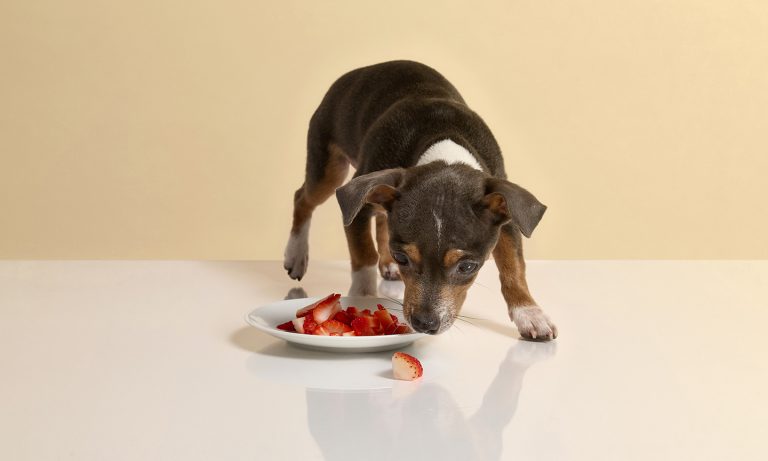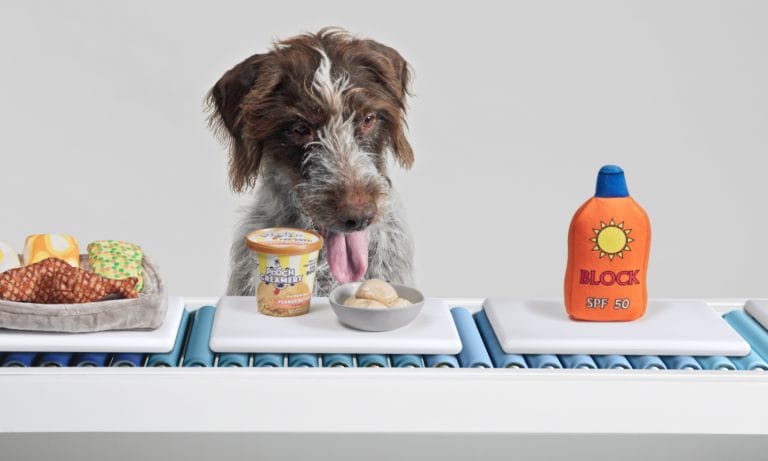If you’re like a lot of pet parents, you might have wondered at some point about what fruits can dogs eat. Maybe you accidentally dropped a piece of banana on the floor or were snacking on apple slices and felt tempted to give into pleading puppy eyes. Can dogs safety eat fruit? The happy answer is that yes, there are a handful of fruits that are perfectly fine to dish up to your dog in small amounts.
To discover what fruits can dogs eat —as well as a few fruits dogs should not eat—we reached out to two veterinarians. Here is their advice what’s okay, how to prepare these approved fresh fruits and how much of each to give your dog.
Apples
- High in vitamin A, zero fat, high in fiber
- Variety of apple doesn’t matter.
- Remove core and stems. It is imperative to remove seeds as they contain a compound that’s toxic to dogs.
- One or two slices is a serving for an average sized dog.
- Store-bought jarred or canned sugar-added applesauce should be avoided.
- Apple pie or other baked goods with apples are also off the menu.
- Preparation: “Remove the core, seeds, and stem, then feed one or two slices as a reasonable serving size,” say Dr. Erin Katribe, veterinarian and medical director for Best Friends Animal Society. “Dogs can eat the peel, but if they have a sensitive intestinal tract, it may be gentler on their system to peel the fruit before feeding.”
- Dog treat portion size: One or two slices is a serving. In addition to feeding your dog apples in small quantities, Dr. Katribe says to only feed your dog fresh apples. Fresh applesauce with no added sugar is OK, but canned applesauce tends to be high in sugar and should be avoided.
- Benefits: No matter the variety of apple you choose, this crunchy sweet treat has zero fat and is high in fiber and vitamin A.
- Learn more about feeding apples to dogs here.

Peter's Apple Slices Small Animal Nature Treats
Natural, healthy small pet treats made from single ingredients without additives, preservatives or flavorings. Crunchy dehydrated treats help encourage dental health while they offer your small pet a delicious and nutritious treat made of premium grade apples.
Blackberries
- High in lots of beneficial vitamins including antioxidants.
- Larger dogs can eat whole berries; mash them for smaller dogs to avoid potential choking hazard.
- Just a few average sized berries make an appropriate serving size.
- Frozen berries are fine as long as they are not sugared. Avoid canned or jarred blackberries as these are likely to contain added sugar or sugar substitutes such as xylitol which is toxic to dogs. Pies made with blackberries or other baked goods are off the menu as are sweetened blackberry jams and spreads.
- Preparation: Wash berries thoroughly (even those that are labeled "organic") before serving. Larger dogs can eat whole berries either fresh or frozen; mash them for smaller dogs to avoid the potential for choking.
- Dog treat portion size: Two or three blackberries as a small treat is great. You can also try Bark Bistro Company Pooch Pancakes Superberry Snoot Dog Treat which are bite-sized treats made with berries and other nutrient-rich superfoods.
- Benefits: Blackberries are a great source of antioxidants (anthocyans), polyphenols, tannin, fiber, manganese, folate, and omega-3s. They're also high in lots of different vitamins, including C, K, A, and E.
- Learn more about feeding blackberries to dogs here.
Blueberries
- High antioxidant capacity including Flavonoids.
- High in vitamins C and K to support your pup’s immune system.
- High in fiber, nutrient-dense and low in calories.
- 85% water content for additional hydration benefits.
- Frozen berries are fine as long as they are not sugared. Avoid canned or jarred blueberries as these are likely to contain added sugar. Pies and other baked goods made with blueberries are off the menu as are sweetened blueberry jams and spreads.
- Preparation: Wash berries thoroughly (even those that are labeled "organic") before serving. Larger dogs can eat whole berries either fresh or frozen; mash them for smaller dogs to avoid the potential for choking.
- Dog treat portion size: Two or three blueberries are a great treat.“Freezing them can make a great warm-weather treat, or you can give them a toss in the air for your pup to catch,” Dr. Katribe suggests. “In general, freezing any type of fruit in bite-size pieces can change the texture and keep things interesting and new for dogs.”
- Benefits: This vitamin-dense, high-antioxidant, low-calorie snack is rich in antioxidants and high in fiber, says Dr. Katribe. Specifically, they contain vitamins C, K, and manganese, and their antioxidant properties can potentially help bolster your dog’s immune system and brain function.
- Learn more about feeding blueberries to dogs here.
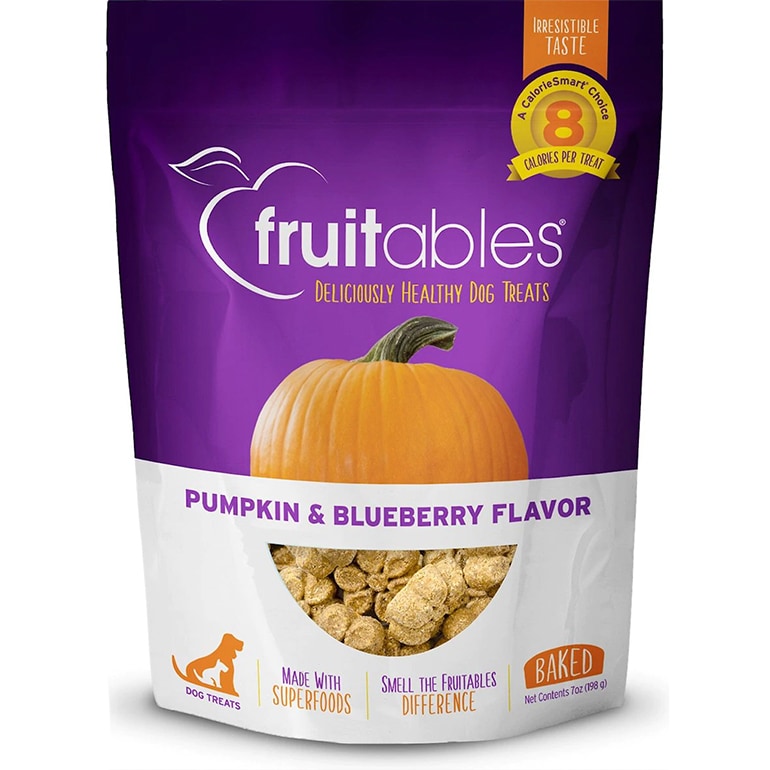
Fruitables Pumpkin & Blueberry Flavor Crunchy Dog Treats
Inspired by delicious muffins straight from the barkery, this combination of organic ingredients including pumpkin and blueberry is a drool-worthy treat or reward for training.
Bananas
- High in many beneficial vitamins.
- Naturally sweet which dogs tend to love so limit serving size.
- Peels should not be served to dogs (compost them!).
- Larger dogs can eat chunks of banana; mash them for smaller dogs to avoid potential choking hazard.
- Preparation: Larger dogs can eat chunks of banana; mash them for smaller dogs to avoid choking. “I recommend peeling and slicing thinly,” says Dr. Katribe. “The peel isn’t toxic and doesn’t have the blockage/obstruction risk that some other peels or rinds do, but the peel can definitely lead to some intestinal upset, such as diarrhea and vomiting.”
- Dog treat portion size: Large dogs should have no more than half a banana. Small dogs should only have a couple of small slices.
- Benefits: This cheerful fruit is available year-round and chock-full of nutritional goodness for your pup. Bananas are high in potassium and low in sodium, notes Dr. Katribe. That said, they do tend to be higher in sugar, so one or two thin slices at a time is plenty.
- Learn more about feeding bananas to dogs here.

Oxbow Simple Rewards Freeze-Dried Banana Small Animal Treats
Made with 100% freeze-dried banana and no added sugar, these are a great source of Vitamin B6 and potassium and contain no artificial colors or preservatives. Feed one-to-two treats a day.
Cantaloupe
- High in lots of beneficial vitamins.
- Do not serve rind (the outer skin).
- Chop into small pieces to avoid choking hazard.
- Preparation: Wash fruit well and then remove outer rind. Scoop out seeds, slice into thin wedges and then chop that into smaller pieces.
- Dog treat portion size: A few small bites are an appropriate treat.
- Benefits: Fresh cantaloupe is a great way to give them an extra source of vitamins A, B, and C. Plus, this juicy, hydrating fruit is high in fiber, beta-carotene, potassium, magnesium, thiamine, niacin, pantothenic acid and folic acid (wow, what a powerhouse!).
Cranberries
- High in lots of beneficial vitamins.
- Can help fight UTIs.
- Serve cooked rather than raw makes digestion easier.
- Avoid canned cranberry products such as cranberry sauce or frozen sweetened cranberries as these may contain added sugar or may be sweetened with xylitol which is toxic to dogs.
- Preparation: Serve cooked rather than raw makes digestion easier. We recommend stewing cranberries so they’re soft and mushy, straining, then adding to your dog’s food as a topper. To stew cranberries, put them in a saucepan with water, cover and cook until tender (about 30 minutes). Do not add sugar or artificial sweeteners to this mixture.
- Dog treat portion size: One to two tablespoons of cooked cranberries with no added sugar as a treat or topper. For a dog treat that contains cranberries, try Hill's Natural Fruity Snacks with Cranberries & Oatmeal Crunchy Dog Treats, an all-natural and crunchy bite that provide the benefits of cranberries without the prep.
- Benefits: Tangy cranberries offer your pup a source of vitamin C, fiber, and manganese. They can also help fight against urinary tract infections (UTIs) and help balance acid-base in dog’s body.
- Learn more about feeding cranberries to dogs here.
Grandma Lucy's Organic Cranberry Oven Baked Dog Treats
Made in the USA with 100% USDA organic, human-quality ingredients for dogs without any preservatives, by-products, artificial sweeteners, colors or flavors, hydrogenated oils or trans fats. Good eats that are good for dogs!
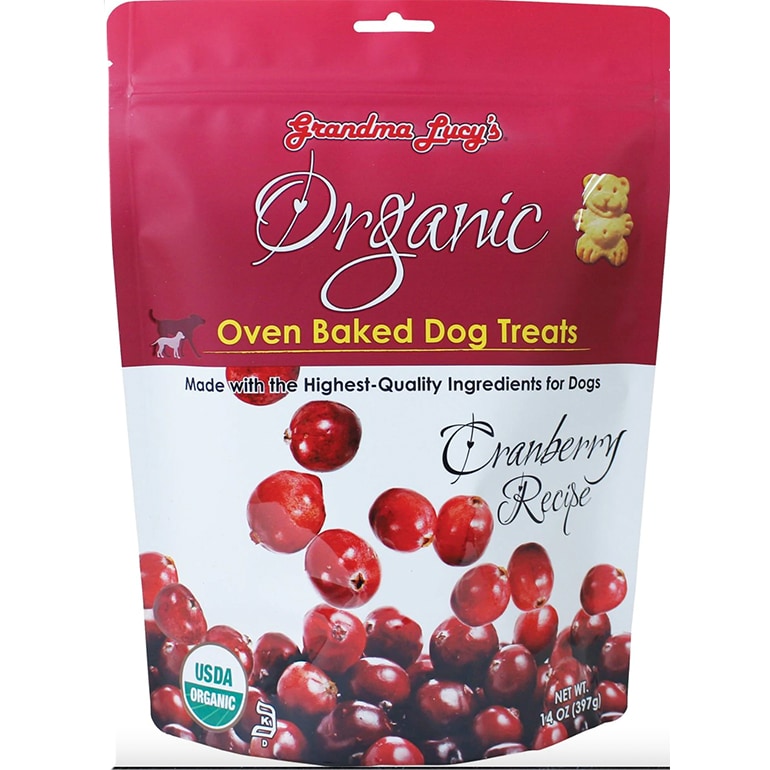
Kiwis
- High in several beneficial vitamins and loaded with fiber.
- Do not serve whole as may present choking hazard.
- Always remove peels and seeds.
- Choose a ripe fruit (firm, brown and fuzzy)
- Preparation: Remove the skin and seeds and cut the fruit into small pieces before feeding. to your dog.
- Dog treat portion size: A half a slice or one slice of kiwi is a good size treat depending on your dog's size and weight.
- Benefits: Kiwis are a source of fiber, potassium and are high in vitamin C.
Oranges
- Loaded with beneficial vitamins and fiber.
- Dogs that are overweight or suffer from diabetes should not be fed this sugary treat.
- Always remove peel and seeds before serving to dogs.
- While orange juice is safe for dogs, it is high in sugar and should be avoided.
- Preparation: Remove the rind and any seeds before feeding your dog an orange slice. Do not feed your dog any part of the orange tree.
- Dog treat portion size: Half of a segment is a good size treat. Limit your dog's orange intake to avoid stomach upset.
- Benefits: Oranges provide dogs with fiber, potassium, calcium, folic acid, iron, flavonoids, phytonutrients, vitamins A, C, B1 and B6.
- Learn more about feeding oranges to dogs here.
Pears
- High in lots of beneficial vitamins.
- Contain beneficial probiotics.
- Can be served raw or cooked and mashed.
- Frozen pears are fine as long as they are not sugared. Avoid canned or jarred pears (including some baby foods) as these may contain added sugar or may be sweetened with xylitol which is toxic to dogs.
- Preparation: Feed raw, or stew and then mash or puree some pear to put on top of your dog’s food. Frozen pears are fine as long as they are not sugared. Avoid canned or jarred pears (such as some baby foods) as these may contain added sugar or may be sweetened with xylitol which is toxic to dogs.
- Dog treat portion size: One or two bite-sized pieces is plenty, or one tablespoon cooked if added to dog food. For an easy way to incorporate pear into your dog’s diet, feed them Nulo Freestyle Duck Recipe With Pears Grain-Free Freeze-Dried Raw Dog Food. This nutrient-dense food is packed with naturally occurring probiotics that support healthy digestion and a strong immune system.
- Benefits: This fruit, available nearly year-round, is an excellent source of fiber, folic acid, niacin, phosphorus, potassium, copper, pectin and vitamins A, C, E, B1 and B2
Pumpkin
- High in lots of beneficial vitamins.
- Promotes a healthy gut; but do not over-serve which can cause tummy upset,
- Canned unsweetened pumpkin is okay but sorry, pumpkin pie filling is off the menu.
- And, that also goes for pumpkin pie.
- Preparation: When giving pumpkin to your dog remove seeds and roast the pumpkin before creating a mash or puree. No need to add any sugar or salt (keep it simple!). Canned unsweetened pumpkin is okay to feed to dogs but sorry, pumpkin pie filling is off the menu—and that also goes for pumpkin pie.
- Dog treat portion size: 1/2 teaspoon for small dogs. One to four tablespoons for large dogs. As an alternative to fresh pumpkin, the Weruva Pumpkin Patch Up! dog and cat food supplement pouches come in single-serve pouches for a quick and easy way to include pumpkin in your dog's food daily. You can also try making DIY pumpkin treats, like these pumpkin pie dog treats.
- Benefits: Pumpkin is a favorite fruit for dogs that tastes good, is easy on their tummy, and delivers lots of nutrients to their diet. This fall favorite is a source of fiber, beta-carotene, alpha-carotene, zinc, iron, potassium, and Vitamin A. Pumpkin is also a popular supplement for dogs as it packs his diet with fiber that aids in digestion and promotes a healthy gut.
- Learn more about feeding pumpkin to dogs here.
Merrick Oven Baked Pumpkin Patch w/ Real Pumpkin Dog Treats
These crunchy dog biscuits are inspired by homemade recipes using real pumpkin. Featuring just four, all-natural ingredients and made in the USA, these snacks are 100% free of corn, wheat, soy and artificial ingredients.
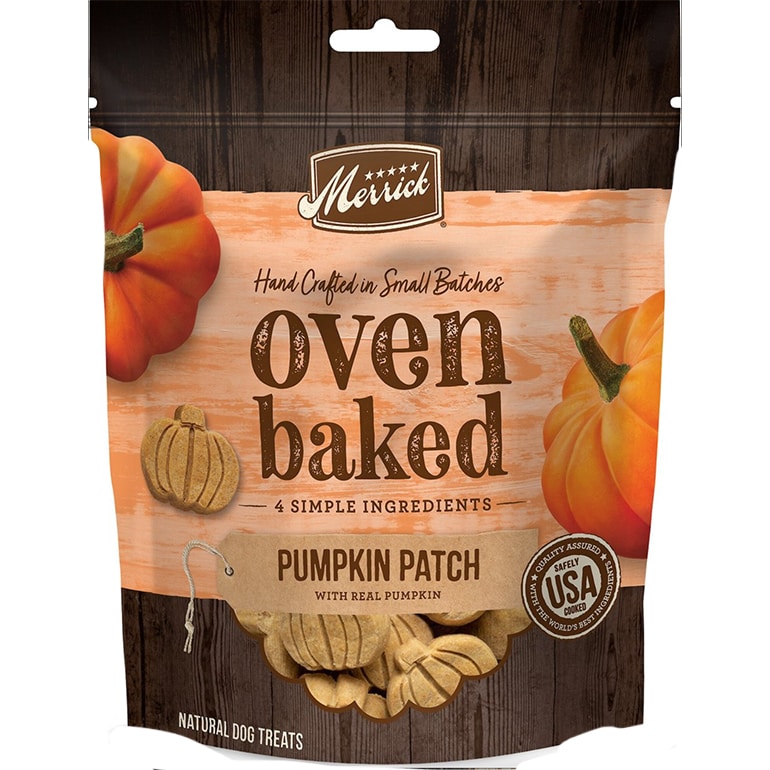
Raspberries
- Rich in nutrients and powerful antioxidants that can reduce the possibility of heart disease, cancer, diabetes, and arthritis.
- Fairly low in calories and high in fiber.
- Raspberries contain a high level of natural xylitol, an all-natural sweetener that can be toxic to dogs in large quantities. Serve raspberries in moderation.
- Preparation: Larger dogs can eat whole berries but you should mash the berries for smaller dogs so they're not a choking hazard. Stick to fresh or frozen (plain) raspberries. Steer clear of canned or jarred raspberries, which likely contain added sugar.
- Dog treat portion size: Two or three raspberries are a good size treat.
- Benefits: These berries are a compact source of dietary fiber, antioxidants, potassium, manganese, copper, iron, magnesium. Not only that, but they are also rich in vitamin C, K and B-complex.
Strawberries
- High in immune system boosting vitamins C, B1, B6, and K.
- High in minerals including potassium, iodine, magnesium, and folic acid.
- Loaded with fiber to aid in digestion.
- Contain Omega-3 for skin and coat health.
- Frozen berries are fine as long as they are not sugared. Avoid canned or jarred strawberries as these are likely to contain added sugar. Pies and other baked goods made with strawberries are off the menu, as are sweetened strawberry jams and spreads.
- Preparation: Wash fresh berries thoroughly (even those labeled as organic). Thaw frozen berries before serving. Chop into smaller pieces to avoid any chocking hazards.
- Dog treat portion size: One full strawberry (or a half of one if it’s an oversized piece) for a tasty, low-calorie treat. If you’re seeking a prepared product, try Fruitables Greek Strawberry Yogurt Flavor crunchy dog treats. They contain limited ingredients that are all-natural.
- Benefits: Rich in fiber (to aid in digestion), potassium, magnesium, iodine, folic acid, and omega-3 fats (for skin and coat health). Contains immune-boosting vitamins C, K, B1 and B6. It also contains an enzyme that can help whiten your dog’s teeth.
- Learn more about feeding strawberries to dogs here.
Watermelon
- High in vitamins A, B1,B5, B6, and C.
- High in minerals including potassium and magnesium.
- High in anti-oxidant carotenoids, including beta-carotene and lycopene.
- Low in calories.
- High in water content for helpful hydration.
- And, it’s fun to eat!
- Preparation: Remove the skin, rind, and the seeds. The skin is difficult to digest, and the rind can cause intestinal obstruction. Cut melon into slices and then chop into smaller pieces.
- Dog treat portion size: A few chunks of watermelon are a satisfying serving.
- Benefits: Refreshing low-calorie treat that tastes good and helps keep your dog hydrated. It also contains a large amount of vitamins A, B1,B5, B6 and C. Additional, watermelon boasts potassium, magnesium and antioxidant carotenoids, including beta-carotene and lycopene.
- Learn more about feeding watermelon to dogs here.
Pooch Creamery Watermelon Flavor Ice Cream Mix Dog Treat
This grain-free, gluten-free and GMO-free powdered ice cream mix is specially crafted for canine companions and contains just five ingredients including lactose-free whole milk and natural. Just add water and freeze.

These Fruits Can Be Toxic to Dogs
Not all fruits are good choices for dogs. These three can cause serious health issues if eaten by your dog.
Share:
